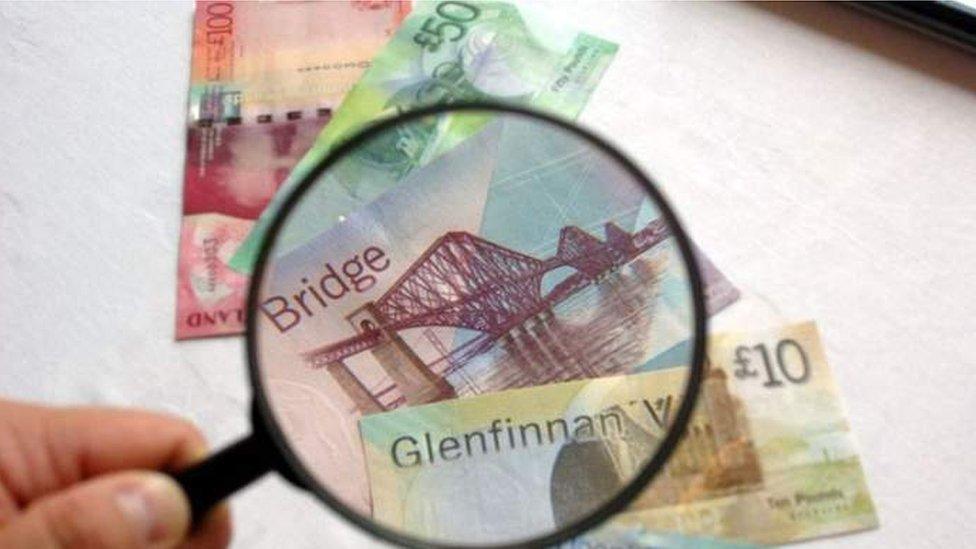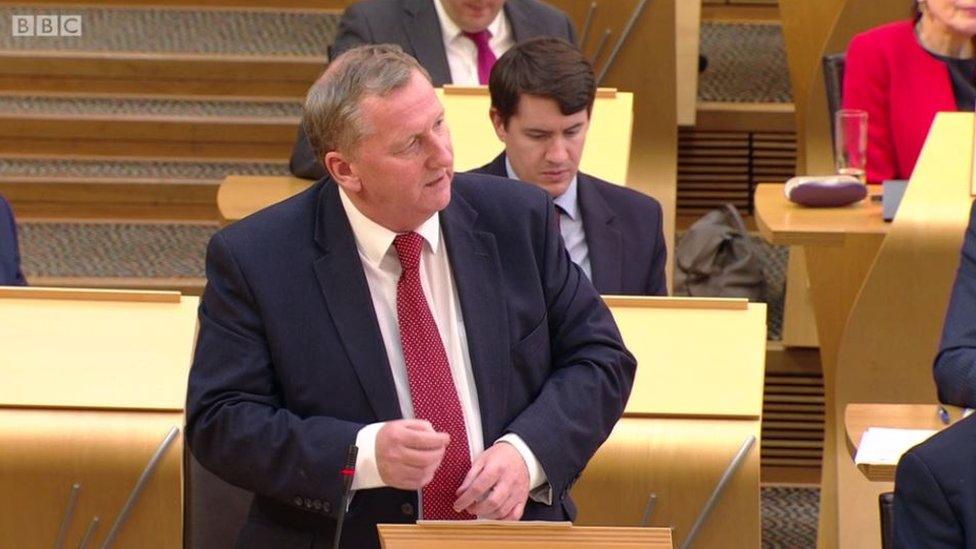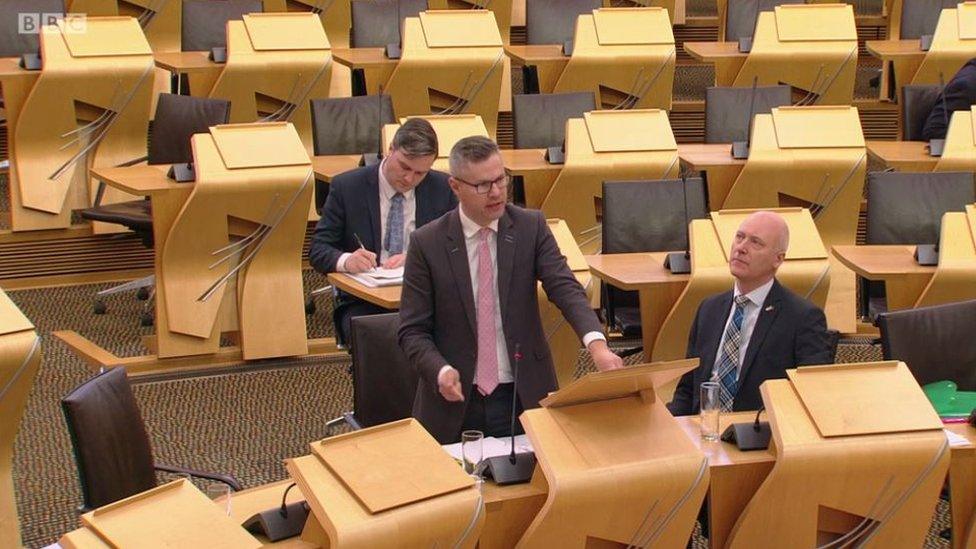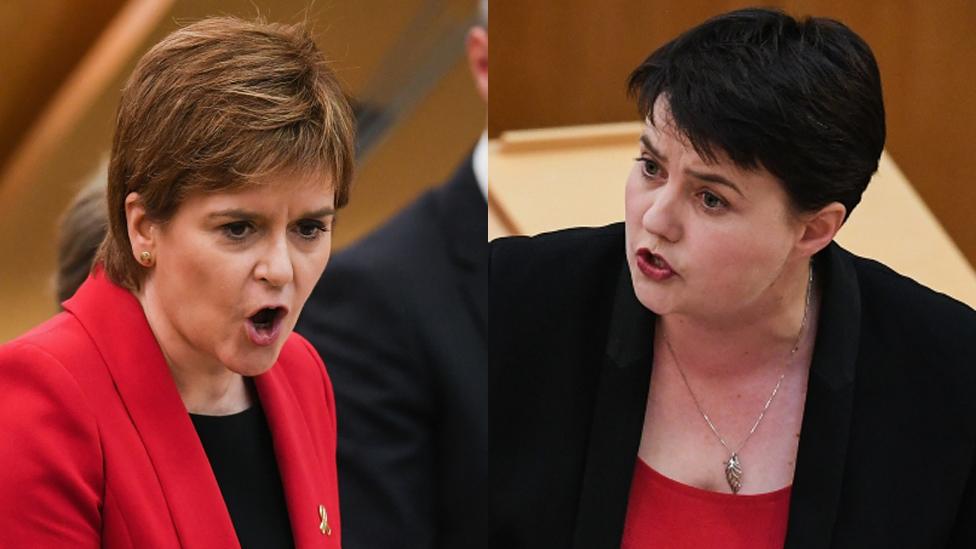MSPs back principle of income tax rises
- Published
- comments

Each of the parties at Holyrood has a different position on income tax
Holyrood has backed the principle of raising income tax to fund investment in public services after the SNP abstained in the final vote.
Scottish Labour put forward a motion for debate aimed at forcing the parties to "pick a side" on the issue.
But the SNP, which has said it has an "open mind" on tax rises, abstained so as not to "prejudge" the debate on tax ahead of the budget.
The Greens and Lib Dems backed Labour, meaning the non-binding motion passed.
The Tories, who are firmly opposed to income tax rises, voted against.
Holyrood took control over income tax rates and thresholds in 2016. Ministers have so far opted not to change the basic rate of tax, but varied the threshold at which the higher 40p rate kicks in.
The last time MSPs debated their various tax policies, parties failed to find any consensus. On this occasion a majority of MSPs backed an increase in tax - although only because of the SNP abstention.
In recent elections, Labour ran on a platform calling for a 50p top rate of tax, but the party kept its motion for the debate broad - "that income tax should be increased to allow greater investment in public services" - in a bid to force other parties to make their positions clear.
Interim leader Alex Rowley said there was a "desperate need" for investment in public services, delivered by a "progressive tax system".
He said: "The SNP faces a choice: tax cuts for the richest and public spending cuts for the rest with the Tories, or using the powers to protect public services with Labour. Today Nicola Sturgeon and her MSPs must make that choice."

Alex Rowley said there was a "desperate need" for investment in public services
The SNP has backed a 50p top rate of income tax UK-wide, but has previously rejected increasing tax rates north of the border alone unless powers over tax avoidance were also strengthened.
The party's manifesto for the 2016 Holyrood elections proposed freezing the basic rate of income tax for the duration of the current parliament.
However, in her recent programme for government speech, Ms Sturgeon said the time was right to "open a discussion about how responsible and progressive use of our tax powers could help build the kind of country we want to be".
Finance Secretary Derek Mackay lodged an amendment for the debate saying MSPs should "reject the current approach to taxation and public spending of the UK government", noting that "all parties' plans will be considered ahead of the Scottish budget".
He said SNP MSPs would not "take a position" in the votes on the debate, to ensure they did not "prejudge the debate on taxation".

The Greens have argued for a radical redesign of the tax system which would see higher earners pay more and those on low incomes pay less, which they lodged as an amendment to Mr Rowley's motion.
Co-convener Patrick Harvie said there must be an end to austerity and the public sector pay cap, but said this must not come about by increasing the tax of lower-income earners.
The Scottish Lib Dems have also called for tax rises, targeting a 1p increase in income tax, something they also promoted in an amendment.
Leader Willie Rennie said it was "significant" that the SNP seemed prepared to move away from its manifesto commitment to freezing the basic rate, calling the fact they were open to debate an "encouraging step".
'Show me yours'
However, the Scottish Conservatives oppose increases, with leader Ruth Davidson claiming Scotland is already the highest-taxed part of the UK and warning higher earners that the government is "coming for their paycheque".
Tory finance spokesman Murdo Fraser lodged an amendment saying there was "no case for raising income tax rates in Scotland above those payable elsewhere in the UK", and saying that "to provide clarity and reassurance for the lowest paid, a rise in the basic rate of income tax should be immediately ruled out".
He hit out at Mr Mackay for not putting forward a position, saying "it's a case of show me yours but I won't show you mine".
In the final votes, all of the amendments fell, before Mr Rowley's motion passed by 33 votes to 30, with 61 abstentions.
- Published7 September 2017

- Published14 December 2016
